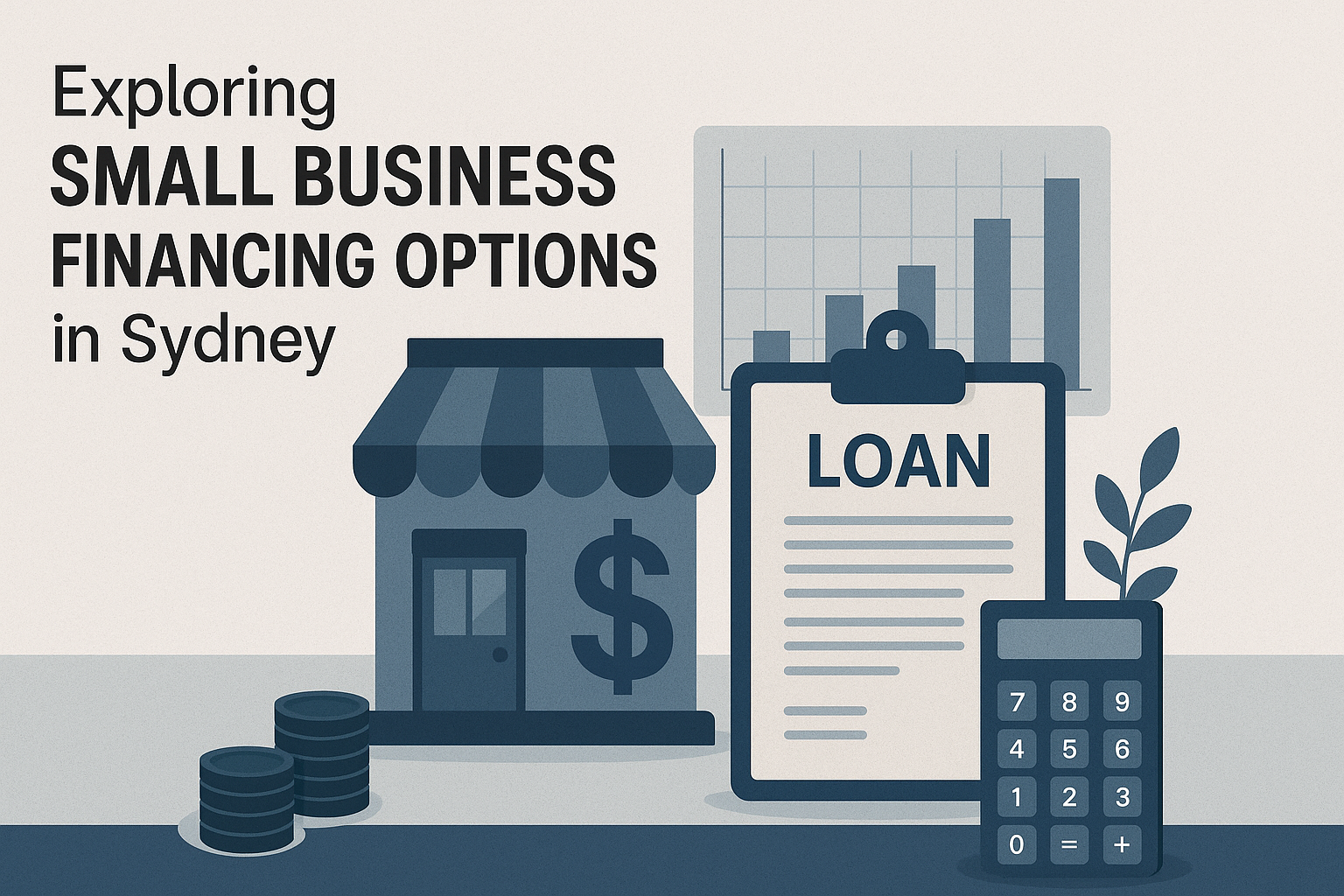Finding the right financing solutions is crucial for small business owners and entrepreneurs in Sydney looking to expand or stabilize their operations.
With a variety of business loans available, understanding the options can help you make informed decisions that align with your financial goals. Whether you’re seeking commercial loans to fund a new project or exploring different business loan interest rates to manage cash flow, the right choice can make all the difference.
In this post, we’ll walk you through small business financing options in Sydney, providing the insights you need to navigate the local business finance landscape confidently. Let’s explore these essential tools that can support your business growth and success.
Note: You can get your free PDF guide on tips for getting a business loan below.
Understanding Business Loans Sydney
Business loans in Sydney offer a range of financing options for local entrepreneurs and small business owners. Let’s explore the types of loans available, eligibility requirements, and the application process.
Types of Business Loans
Business loans in Sydney come in various forms to suit different needs. The most common types include term loans, lines of credit, and invoice financing.
Term loans provide a lump sum that’s repaid over a set period. They’re ideal for large purchases or long-term investments.
Lines of credit offer flexible access to funds, allowing businesses to draw money as needed. This option works well for managing cash flow or handling unexpected expenses.
Invoice financing lets businesses borrow against unpaid invoices, providing quick access to cash tied up in accounts receivable.

Eligibility Criteria for Loans
Lenders in Sydney typically assess several factors when determining loan eligibility. These criteria help them gauge the risk associated with lending to a business.
Key eligibility factors often include:
-
Business age (usually at least 6-12 months of operation)
-
Annual revenue (minimum requirements vary by lender)
-
Credit score of the business owner
-
Collateral (for secured loans)
Lenders may also consider the industry, business plan, and financial projections. It’s important to note that requirements can vary significantly between different financial institutions.
Application Process for Sydney Loans
The loan application process in Sydney typically involves several steps. Understanding these can help streamline your application and increase your chances of approval.
-
Gather necessary documents (financial statements, tax returns, business plan)
-
Research and compare lenders
-
Submit your application
-
Undergo a credit check and business assessment
-
Receive and review the loan offer
-
Accept terms and receive funds
Preparation is key. Having all your documents ready and understanding your financial position can speed up the process significantly.
Small Business Financing Essentials
Small business financing is a crucial tool for growth and stability. Let’s examine the benefits, risks, and essential financial management tips for Sydney businesses.
Key Benefits of Business Financing
Business financing can provide significant advantages for small businesses in Sydney. It offers opportunities for growth and stability that might otherwise be out of reach.
Access to capital allows businesses to invest in new equipment, expand operations, or hire additional staff. This can lead to increased productivity and revenue.
Financing can also help manage cash flow, bridging gaps between expenses and income. This is particularly useful for businesses with seasonal fluctuations or long payment cycles.
Moreover, some loans can help build business credit, which can be beneficial for future financing needs.
Risks and Considerations
While business financing can be beneficial, it’s essential to understand the potential risks involved. Taking on debt requires careful consideration and planning.
The primary risk is the obligation to repay the loan, regardless of business performance. This can strain cash flow, especially if revenue doesn’t increase as expected.
Interest rates and fees can add significant costs to the loan. It’s crucial to understand the total cost of borrowing, not just the principal amount.
Some loans may require collateral, putting personal or business assets at risk if you default on payments.
Financial Management Tips
Effective financial management is crucial when dealing with business loans. Here are some key tips to help Sydney businesses manage their finances responsibly.
Create a detailed budget that accounts for loan repayments. This helps ensure you can meet your obligations without straining your cash flow.
Regularly review your financial statements to track your business’s performance and adjust your strategy as needed.
Consider setting up a separate account for loan funds to help track usage and ensure the money is used for its intended purpose.
Always communicate with your lender if you’re facing difficulties. Many lenders are willing to work with businesses to adjust repayment terms if necessary.
Exploring Loan Options
Sydney businesses have access to a variety of loan options. Understanding the differences between these options can help you choose the best fit for your needs.
Short-term vs Long-term Options
Short-term and long-term loans serve different purposes and come with distinct advantages and disadvantages.
Short-term loans typically have terms of 3-18 months. They’re helpful for immediate needs like inventory purchases or covering temporary cash flow gaps.
Long-term loans, with terms of 1-5 years or more, are better suited for significant investments like equipment purchases or business expansion.
Secured vs Unsecured Loans
The choice between secured and unsecured loans depends on your business assets and risk tolerance.
Secured loans require collateral, such as property or equipment. They often offer lower interest rates because the lender has a claim on the collateral if you default.
Unsecured loans don’t require collateral but typically have higher interest rates to compensate for the increased risk to the lender.
Businesses with valuable assets might prefer secured loans for better rates, while those without suitable collateral or who want to avoid risking assets might opt for unsecured loans.
Alternative Lending Sources
Beyond traditional banks, Sydney businesses can explore alternative lending sources for financing.
Online lenders often offer faster approval processes and more flexible terms. They may be more willing to work with newer businesses or those with less-than-perfect credit.
Peer-to-peer lending platforms connect businesses directly with investors. This can sometimes result in more favorable terms, especially for companies with strong growth potential.
Government grants and programs can provide funding for specific industries or purposes. While often competitive, these can offer favorable terms or even non-repayable funds.
Navigating Sydney Business Finance
The Sydney business finance landscape offers numerous options for small businesses. Let’s explore top lenders, compare interest rates, and look at successful financing case studies.
Top Lenders in Sydney
Sydney boasts a diverse range of lenders catering to small businesses. These include major banks, online lenders, and specialized financial institutions.
Major banks like Commonwealth Bank, ANZ, and Westpac offer a wide range of business loan products. They often provide competitive rates but may have stricter eligibility criteria.
Online lenders such as Prospa and Moula have gained popularity for their quick approval processes and flexible terms. They can be a good option for businesses that don’t meet traditional bank criteria.
Government-backed lenders like the Small Business Finance Scheme provide loans with favorable terms to eligible businesses, often focusing on specific industries or growth stages.
Comparing Business Loan Interest Rates
Interest rates play a crucial role in the total cost of a business loan. Rates in Sydney can vary widely based on several factors.
Key factors affecting interest rates include:
-
Loan type and term
-
Business credit score
-
Lender policies
-
Market conditions
It’s important to compare annual percentage rates (APR) rather than just the stated interest rate, as APR includes fees and gives a more accurate picture of the loan’s cost.
Remember, the lowest rate isn’t always the best deal. Consider factors like repayment flexibility, loan terms, and customer service when choosing a lender.
Case Studies of Successful Financing
Let’s look at two Sydney businesses that successfully used financing to grow their operations.
Case 1: Sydney Cafe Chain
-
Borrowed $200,000 for expansion
-
Used funds to open two new locations
-
Increased revenue by 150% in 18 months
-
Repaid loan early, saving on interest
Key takeaway: Strategic use of financing for expansion can lead to significant growth.
Case 2: Tech Startup
-
Secured $500,000 line of credit
-
Used funds for product development and marketing
-
Attracted venture capital investment within a year
-
Grew team from 5 to 25 employees
Key takeaway: Flexible financing options can provide the runway needed for rapid growth and attract further investment.
Commercial Loans for Growth
Commercial loans can be a powerful tool for business growth in Sydney. Let’s explore how these loans can be used for expansion, real estate, and equipment financing.
Expanding with Commercial Loans
Commercial loans can provide the capital needed for significant business expansion. This can include opening new locations, entering new markets, or scaling operations.
When considering a commercial loan for expansion:
-
Create a detailed business plan outlining how the funds will be used
-
Project potential return on investment
-
Consider the impact on cash flow and ability to repay
Remember, expansion should be carefully planned. Ensure your business is ready for growth before taking on additional debt.
Real Estate Financing for Businesses
Real estate loans can help Sydney businesses purchase property or renovate existing spaces. This can be a significant step in establishing a permanent presence or improving operations.
Types of real estate financing include:
-
Commercial mortgages for property purchase
-
Construction loans for building new facilities
-
Renovation loans for improving existing properties
When considering real estate financing, factor in not just the loan costs, but also ongoing expenses like property taxes, insurance, and maintenance.
Equipment and Inventory Financing
Equipment and inventory financing can help businesses acquire necessary assets without depleting cash reserves.
Equipment loans allow businesses to purchase machinery, vehicles, or technology. These loans often use the equipment itself as collateral, potentially leading to better rates.
Inventory financing helps businesses stock up on products, which can be particularly useful for seasonal businesses or those looking to take advantage of bulk discounts.
When considering these loans, compare the cost of financing against the potential return. Will the new equipment or inventory increase efficiency or sales enough to justify the loan?




